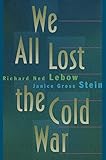We All Lost the Cold War / Richard Ned Lebow, Janice Gross Stein.
Material type: TextSeries: Princeton Studies in International History and Politics ; 55Publisher: Princeton, NJ : Princeton University Press, [1995]Copyright date: ©1995Edition: Course BookDescription: 1 online resource (566 p.)Content type:
TextSeries: Princeton Studies in International History and Politics ; 55Publisher: Princeton, NJ : Princeton University Press, [1995]Copyright date: ©1995Edition: Course BookDescription: 1 online resource (566 p.)Content type: - 9780691019413
- 9781400821082
- Arab-Israeli conflict -- 1973-1993
- Arab-Israeli conflict -- 1973-1993
- Cold War
- Cuban Missile Crisis, 1962
- Nuclear warfare
- Nuclear weapons
- HISTORY / Modern / 20th Century
- 1960 U-2 incident
- Abstention
- Allen Dulles
- Allied-occupied Germany
- Andrei Gromyko
- Anti-imperialism
- Anti-war movement
- Assassination
- Berlin Blockade
- Berlin Crisis of 1961
- Berlin Wall
- Blockade
- Ceasefire
- Censorship
- Cold War II
- Cold War
- Communist revolution
- Containment
- Coup d'état
- Cuban Missile Crisis
- Dean Rusk
- Decapitation
- Declaration of war
- Deterrence theory
- Dictatorship
- Disarmament
- Disinformation
- Dissolution of the Soviet Union
- Doomsday device
- Dr. Strangelove
- Embargo
- Era of Stagnation
- Evil empire
- Failed state
- Fallout shelter
- George Ball (diplomat)
- Glasnost
- Henry Kissinger
- Hungarian Revolution of 1956
- Impeachment
- Impunity
- International crisis
- Jimmy Carter
- John F. Kennedy
- John Foster Dulles
- John Mueller
- Joseph Stalin
- Leonid Brezhnev
- McCarthyism
- McGeorge Bundy
- Minimal deterrence
- Minister without portfolio
- Molotov–Ribbentrop Pact
- Moscow Conference (1941)
- Mutual assured destruction
- NATO
- Nikita Khrushchev
- Nuclear blackmail
- Nuclear disarmament
- Nuclear holocaust
- Nuclear warfare
- Old Bolshevik
- Operation Barbarossa
- Perestroika
- Persecution
- Pessimism
- Political prisoner
- Pre-emptive nuclear strike
- Preventive war
- Proxy war
- Purge
- Quarantine Speech
- Ridicule
- Roswell Gilpatric
- Roy Medvedev
- Saturday Night Massacre
- Sergei Khrushchev
- Soviet Empire
- Soviet Navy
- Soviet Union
- Soviet Union–United States relations
- Soviet people
- Soviet withdrawal from Afghanistan
- Soviet–Afghan War
- Stalinism
- Strategic Arms Limitation Talks
- Superiority (short story)
- Surgical strike
- The CIA and the Cult of Intelligence
- There is no alternative
- Treaty on the Final Settlement with Respect to Germany
- War at Sea
- War of Attrition
- War of ideas
- War termination
- War-weariness
- War
- Warfare
- Why England Slept
- Yom Kippur War
- 327.7304709045
- D849 .L425 2001
- online - DeGruyter
| Item type | Current library | Call number | URL | Status | Notes | Barcode | |
|---|---|---|---|---|---|---|---|
 eBook
eBook
|
Biblioteca "Angelicum" Pont. Univ. S.Tommaso d'Aquino Nuvola online | online - DeGruyter (Browse shelf(Opens below)) | Online access | Not for loan (Accesso limitato) | Accesso per gli utenti autorizzati / Access for authorized users | (dgr)9781400821082 |
Frontmatter -- CONTENTS -- PREFACE -- ABBREVIATIONS -- CHAPTER ONE Introduction -- PART ONE: THE CUBAN MISSILE CRISIS, 1962 -- CHAPTER TWO. Missiles to Cuba: Foreign-Policy Motives -- CHAPTER THREE. Missiles to Cuba: Domestic Politics -- CHAPTER FOUR. Why Did Khrushchev Miscalculate? -- CHAPTER FIVE. Why Did the Missiles Provoke a Crisis? -- CHAPTER SIX. The Crisis and Its Resolution -- PART TWO: THE CRISIS IN THE MIDDLE EAST, OCTOBER 1973 -- CHAPTER SEVEN. The Failure to Prevent War, October 1973 -- CHAPTER EIGHT. The Failure to Limit the War: The Soviet and American Airlifts -- CHAPTER NINE. The Failure to Stop the Fighting -- CHAPTER TEN. The Failure to Avoid Confrontation -- CHAPTER ELEVEN. The Crisis and Its Resolution -- PART THREE: DETERRENCE, COMPELLENCE, AND THE COLD WAR -- CHAPTER TWELVE. How Crises Are Resolved -- CHAPTER THIRTEEN. Deterrence and Crisis Management -- CHAPTER FOURTEEN. Nuclear Threats and Nuclear Weapons -- POSTSCRIPT: Deterrence and the End of the Cold War -- NOTES -- APPENDIX -- NAME INDEX -- GENERAL INDEX
restricted access online access with authorization star
http://purl.org/coar/access_right/c_16ec
Drawing on recently declassified documents and extensive interviews with Soviet and American policy-makers, among them several important figures speaking for public record for the first time, Ned Lebow and Janice Stein cast new light on the effect of nuclear threats in two of the tensest moments of the Cold War: the Cuban Missile Crisis of 1962 and the confrontations arising out of the Arab-Israeli war of 1973. They conclude that the strategy of deterrence prolonged rather than ended the conflict between the superpowers.
Mode of access: Internet via World Wide Web.
In English.
Description based on online resource; title from PDF title page (publisher's Web site, viewed 30. Aug 2022)


